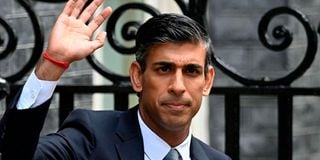Premium
History is made as UK gets new Premier – a British-born Asian

Britain's newly appointed Prime Minister Rishi Sunak waves as he poses outside the door to 10 Downing Street in central London, on October 25, 2022, after delivering his first speech as prime minister.
What you need to know:
- He is Rishi Sunak, a practising Hindu and the first British Asian to hold the nation’s highest office; he is also, at age 42, the youngest for some 200 years.
- Mr Sunak’s “coronation” as the third premier in two months climaxed a period of turmoil which embarrassed and bewildered many British people and came close to making the country an international laughing stock.
- Yet another party ballot took place and this time Sunak, the only candidate, was elected by some 200 Conservative MPs without opposition.
After weeks of confusion, ill-temper, accusations, denials, twists and turns, Britain last week got herself a new prime minister, that is, another new prime minister.
He is Rishi Sunak, a practising Hindu and the first British Asian to hold the nation’s highest office; he is also, at age 42, the youngest for some 200 years.
Mr Sunak’s “coronation” as the third premier in two months climaxed a period of turmoil which embarrassed and bewildered many British people and came close to making the country an international laughing stock.
It all began in September when PM and Tory party leader Boris Johnson resigned under pressure from his own MPs. According to the Westminster parliamentary model, the leader of the ruling party automatically becomes prime minister and it is up to that party to name a new leader, thus a new prime minister, should an incumbent quit.
There is much opposition to this system, invariably from the opposition party leaders, who demand a general election instead, as have the Labour Party and the Scottish Nationalist Party, vociferously, in the present case.
Although Rishi Sunak stood for the premiership after Johnson, he was defeated in a vote by Conservative party members and MPs, who preferred Liz Truss. She, however, introduced economic policies that were so widely criticised she resigned after only 45 days, the shortest-lived MP in the country’s history.
Yet another party ballot took place and this time Sunak, the only candidate, was elected by some 200 Conservative MPs without opposition.
In a nation facing a multitude of problems, all eyes now focus on Mr Sunak, particularly on his expertise in the sphere of economics, where he is no novice, being a former Chancellor of the Exchequer (finance minister) and with experience in international banking.
Rishi Sunak was born in Southampton to East African Hindu parents of Punjabi-Indian descent. His father, Yashvir, was born and raised in pre-independent Kenya, and his mother, Usha, in what was then colonial Tanganyika.
After moving to Britain in the 1960s, Yashvir practised as a doctor, while Usha ran a pharmacy. Rishi attended Winchester College, a public school, where he was head boy. During his summer holidays, he worked as a waiter in a Southampton curry house.
First-class degree
After securing a First Class university degree in Philosophy, Politics and Economics, at Lincoln College, Oxford, Sunak worked for Goldman Sachs and two hedge funds. He was elected as the Conservative MP for Richmond, North Yorkshire in 2015.
Sunak’s wife is Akshata Murthy, the daughter of an Indian billionaire, Narayana Murthy. As a result, Rishi’s and his wife’s joint wealth has been estimated at some £730 million. The couple has two daughters.
Sunder Katwala, director of the think tank, British Future, said the choice of a British Asian as head of government was historic, adding, “This simply would not have been possible even a decade or two ago.”
In his first speech as prime minister, delivered outside his new home, 10 Downing Street, Mr Sunak warned of “difficult decisions” ahead as his government grappled with a “profound economic crisis.”
He said he would put “economic competence and ability at the heart of this government’s agenda,” and warned that such action would mean “difficult decisions to come”.
* * *
More insights into the British people and how they think ... a survey about national obsessions for Sky Television revealed that the number one national talking point is (no surprise, here) the weather.
That is followed, in order, by football, traffic, queuing, prices, politics, what we have for tea and family pets.
As for domestic disharmony, according to a different probe, leaving dirty clothes on the bedroom floor is the biggest cause of rows in the home.
Other common causes of friction are not replacing garbage bin bags, leaving lights on and failing to change the toilet roll.
As for public good manners, the Confederation of Passenger Transport calculates that bus drivers around Britain are thanked an average of 37 times a day. Ninety per cent of drivers said it boosts their well-being.
According to the survey, passengers in the Midlands and East Anglia are the most appreciative, Londoners the least.
* * *
A politician visited a rural village and asked what their needs were. “Sir, we have two basic needs,” the village leader said. “Firstly, we have a medical centre, but there is no doctor.”
The politician whipped out his cell phone and after speaking animatedly for a while, he assured the village that a doctor would be there the very next day. He then asked about their second problem.
“Our second problem,” said the chief, “is that there is no cellphone coverage anywhere in this village.”
***
A boy decided to have a look at Parliament and parked his bike in Parliament Square. Immediately, a policeman came up and asked, “Why did you park your bicycle there? Don’t you know many politicians use this road?”
“That’s all right, officer,” the boy replied, “I put a strong lock on my bike.”





